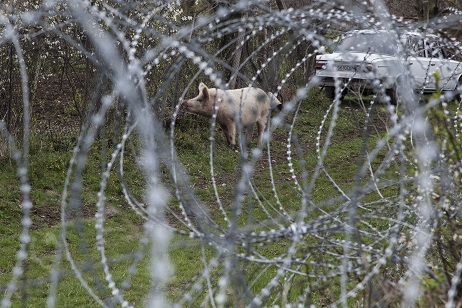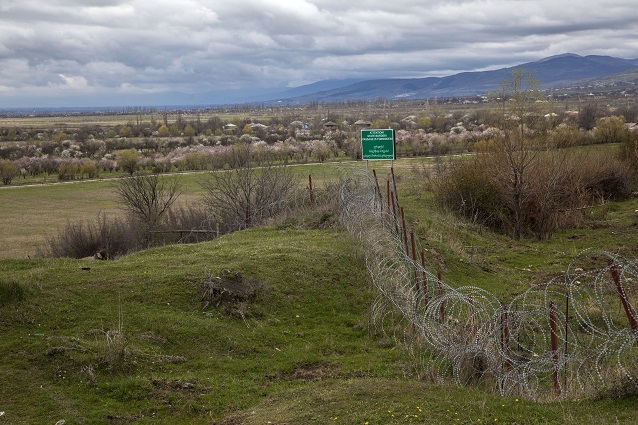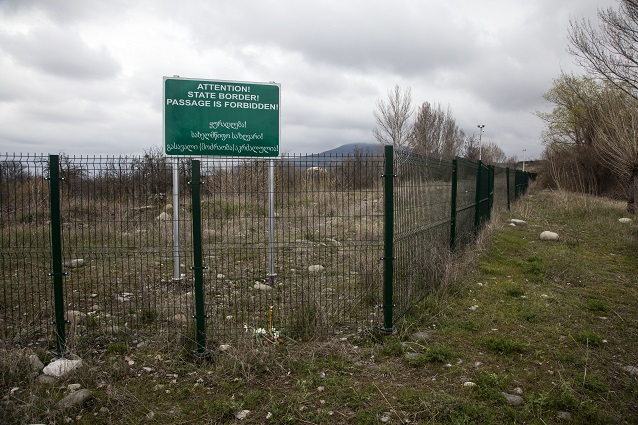Russian barbed wire fences cover 63km of Georgian land

The total length of barbed wire fences illegally erected by Russian occupational troops on Georgian soil is 63km, as of today.
Of this, about 51km of the artificial barriers lie along the occupation line in Tskhinvali region (South Ossetia) and similar barbed wire fences covered a stretch of more than 12km in the Abkhazian region.
Both of these two regions – Abkhazia and Tskinvali – make up 20 percent of Georgia’s territory, currently occupied by Russia.

The village of Khurvaleti in Tskhinvali region, Georgia. Photo by Nino Alavidze/Agenda.ge
The artificial barriers installed by Russian occupational forces often ran through local villager’s orchards, yards, grazing fields, agricultural plots and cemeteries. Tbilisi officials believes the installation of barbed wire fences violated basic human rights such as the right to free movement, the right to property, the right to family life and the right to gaining an education in the native language.
All cases of human rights violation in Georgia’s occupied regions were collated into one document for the global community to review.
Georgia’s Foreign Ministry presented a report it had prepared on the human rights situation in Abkhazia and Tskhinvali region. This report covered the period of October-December 2015.
"It should be emphasised that gross violations of human rights, including inhuman treatment, arbitrary detention, restriction of freedom of movement and mass infringement of property rights and the right to receive an education in the native language continue to be reported from the occupied territories. The installation of barbed wire fences across the occupation line further aggravated an already grave situation,” the Ministry’s report said.

The village of Ergneti in Tskhinvali region, Georgia. Photo by Nino Alavidze/Agenda.ge
The document paid particular attention to a new process of so-called ‘passportisation’ and issuance of new regulations on legal status of foreigners in the region of Abkhazia.
- During the reporting period a new wave of so-called ‘passportisation’ began in Abkhazia. This implied issuance of 300,000 new documents – 250,000 so-called ‘passports’ and 50,000 so-called ‘residence permits’ and their distribution by February 2016 at the latest.
Tbilisi believed the adoption of the so-called law on legal status of foreigners on February 1, 2016 by the occupation regime of Abkhazia was directly linked to the illegal wave of ‘passportisation’, which could lead to "another wave of ethnic cleansing”.
On January 23, 2016 a similar document was adopted by the Tskhinvali occupation regime. The idea to adopt such regulations was declared in November 2015 when leader of the Sokhumi occupation regime said the big number of residents of Abkhazia with Georgian citizenship was "alarming” and this was why new regulations on the ‘legal status of foreigners’ were needed.
"Adoption of so-called laws targets the ethnic Georgian population living in the occupied territories,” Georgia’s Foreign Ministry said.
"These regulations will further deteriorate their grave conditions: new restrictions will be imposed on the freedom of movement, the right to properly and labour rights. There is a threat that this so-called law can become grounds for another wave of ethnic cleansing.”
The Ministry said it should be kept in mind that the Abkhaz occupation regime had also adopted a so-called law on entry and exit regulations of Abkhazia, which when operational, would create additional obstacles for representatives of international organisations leading to further isolation of the region.
The report also involved the exact number of illegal detentions along the Russian occupations line on Georgian territory and described cases of other human rights violations on the ground.
Read the full report below.
 Tweet
Tweet  Share
Share